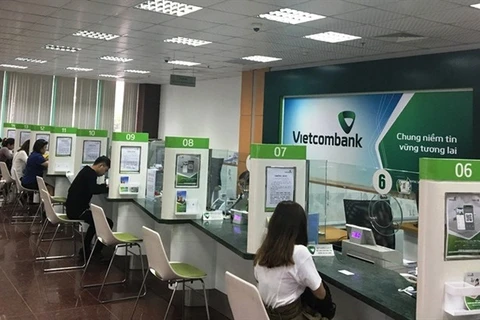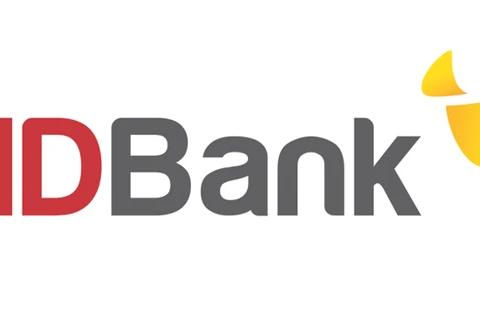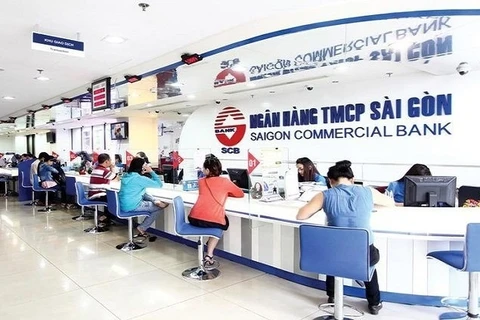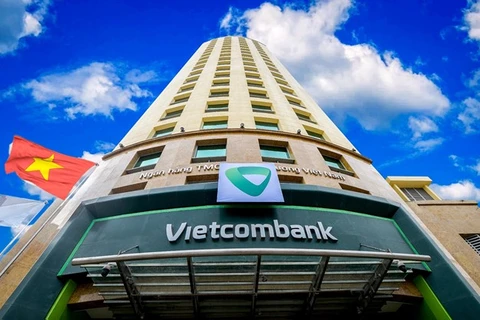Hanoi (VNA) – Capital limitations hinder banks from meeting regulations on capital adequacy ratio (CAR) and performing their business due to a series of other regulations.
The story on raising charter capital of banks to meet Basel II, an international business standard that requires financial institutions to have enough cash reserves to cover risks incurred by operations, especially of State banks, by 2020 is hotter than ever as the four biggest commercial banks, the Bank for Investment and Development of Vietnam (BIDV), the Vietnam Bank for Industry and Trade (VietinBank), the Vietnam Bank for Agriculture and Rural Development (Agribank) and the Bank for Foreign Trade of Vietnam (Vietcombank) altogether voiced their concerns at a conference reviewing the banking system’s performance in the presence of Prime Minister Nguyen Xuan Phuc.
In fact, the issue has been repeatedly raised in three recent years. If private joint stock banks made efforts and succeeded, notably the two smaller banks, VIB and OCB, which satisfied Basel II requirements one year ahead of schedule, big banks, excepted for Vietcombank, are struggling to seek ways to raise their charter capital.
Capital limitations hinder banks from meeting CAR regulations and performing their business due to a series of other regulations. That’s why at many meetings, leaders of these banks and the State Bank of Vietnam have expressed wishes that the State would facilitate banks’ charter capital increase via paying dividends in shares to accumulate capital and reducing State ownership to lower than the current cap as quick-fix solutions.
Raising charter capital – banks altogether calling for help
By the end of 2018, all Vietcombank, Vietinbank, BIDV, and Agribank reported high profits. Despite of that, they still asked for permission to raise charter capital as capital is always viewed as the vitality of banks.
At the conference initiating bank tasks in 2019, representatives from several State commercial banks took the floor reporting their banks’ business performance in 2018 and those from the four above-said banks proposed the same issue relating to raising charter capital.
Among the four banks, VietinBank desperately needs to raise its charter capital.
According to CEO Le Duc Tho, the CAR ratio of the lender currently reaches the minimum level under the regulations of the central bank. VietinBank has already adopted all measures to increase its capital to the maximum. It is hampered by the existing regulations on State ownership and foreign ownership at State-owned banks as well as the ratios of secondary bonds and secondary debts. Consequently, VietinBank saw credit expansion of only 6 percent last year, the lowest in over 10 years. This affected its ability to cope with the capital demand of businesses and had direct impact on the business results of the bank and the State budget revenue.
Raising charter capital is urgently needed by BIDV when its total assets near 1.283 quadrillion VND while charter capital is close to 34.2 trillion VND, the lowest level among the three equitized State commercial banks. However, over the past three years, BIDV has yet increased its charter capital though it introduced three to four plans for the issue a year.
In 2016, BIDV and VietinBank submitted a proposal to their biggest shareholder – the State Bank of Vietnam – on changing the method of paying dividends of 2015 from cash to shares to accumulate capital. The proposal was accepted by the management agency, but rejected by the Ministry of Finance, reasoning tightened budget.
In 2017, BIDV continued introducing a series of plans, from issuing an Employee Stock Ownership Plan (ESOP) to paying dividends in shares but none of them were realized. It found a strategic partner which is KEB Hana of the Republic of Korea. However, there are binding conditions applied for foreign investors.
For Agribank, due to slow equitization it has the lowest charter capital among the four banks, at over 30.7 trillion VND.
“If we don’t have charter capital injections, by 2019 the bank cannot meet the minimal CAR regulations and the situation would affect its prestige and capacity to provide more credit for the national economy,” said Trinh Ngoc Khanh, President of the Board of Directors of Agribank.
Charter capital increase is associated closely with Agribank’s equitization process, which is facing a lot of difficulties, with the biggest being asset assessment. According to Khanh, Agribank is the last State-owned bank to be equitized so it will be difficult for the bank to seek foreign strategic partners.
Vietcombank was the most successful bank among the four after making a record profit of over 18 trillion VND in 2018, a surge of 63 percent from 2017.
In addition, Vietcombank has become one of the first banks which received a decision from the State Bank of Vietnam for meeting Basel II regulations ahead of schedule.
Despite of those achievements, Nghiem Xuan Thanh, Chairman of the Board of Directors of Vietcombank, still proposed paying dividends in “shares” in a bid to raise the bank’s charter capital to ensure its CAR ratio.
He asked for permission for other State commercial banks to raise their charter capital from the enterprises’ support fund.
System risks
According to the VietinBank CEO, though its CAR ratio has reached the minimum level since the end of September 2018, VietinBank cannot increase credit provision while the economy’s demand for capital is surging.
“If VietinBank cannot increase credit provision, it will hugely affect the supply of capital for the economy as well as the funding of important projects. This will have great effect on economic growth and State budget collection as businesses meet difficulties in accessing credit,” Tho said.
He submitted his bank’s proposal on paying dividends in shares from 2017 to 2020 and allocating capital to raise its charter capital.
According to statistical reports, the minimum CAR level of State commercial banks is 9.39 percent while that of commercial joint stock banks is 11.34 percent.
As the four State commercial banks account for half of the total assets and 40 percent of the operation of the banking system, their charter capital decrease will pose risks to the entire banking system.
Banking-finance expert Nguyen Tri Hieu said if charter capital is not raised, risk is bigger as according to Basel II regulations, a bank has adequate capital for the risk the bank exposes itself to through its lending, investment and trading activities. Basel II regulations aimed to ensure that the more significant the risk a bank is exposed to, the greater the amount of capital the bank needs to hold to safeguard its solvency and overall economic stability.
Pham Hong Hai, Director General of HSBC Vietnam, said CAR remains a concern as capital shortage is an increasing risk of the Vietnamese economy in the context that the Government’s growth strategy is led by credit.
Attracting more investments in capital, especially from strategic foreign investors, is important to the issue of raising charter capital of State banks. However, this will urgently require reforms, quality improvements, transparency, and macro measures, Hai said.-VNA



























